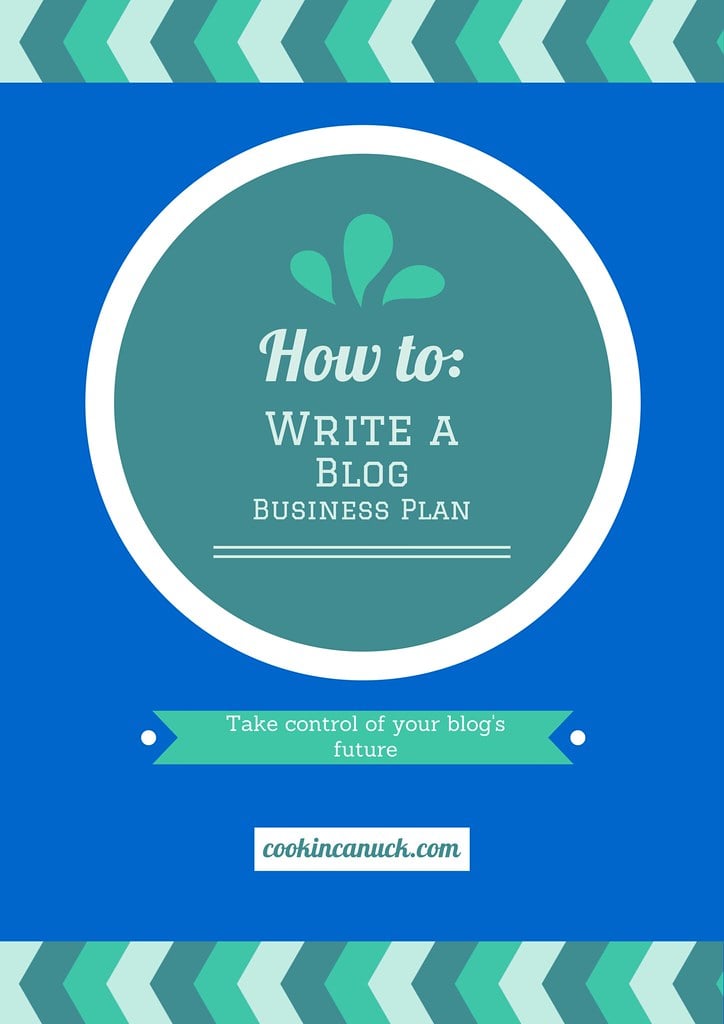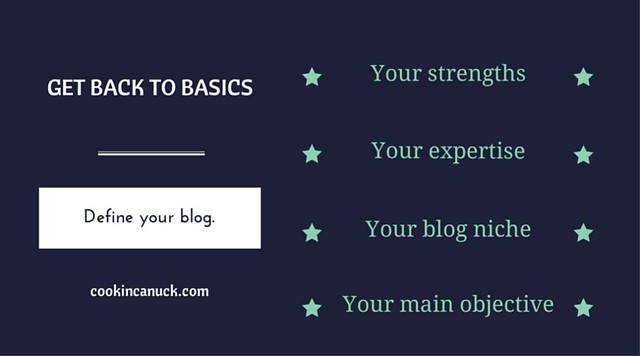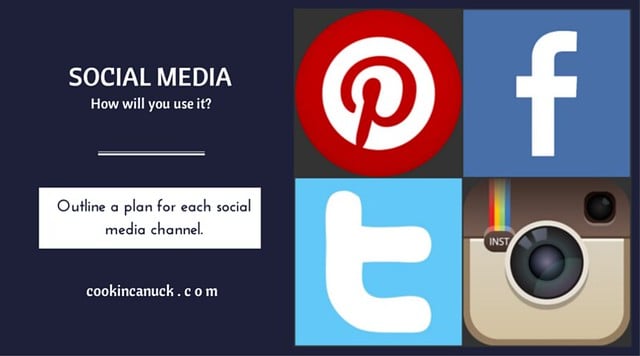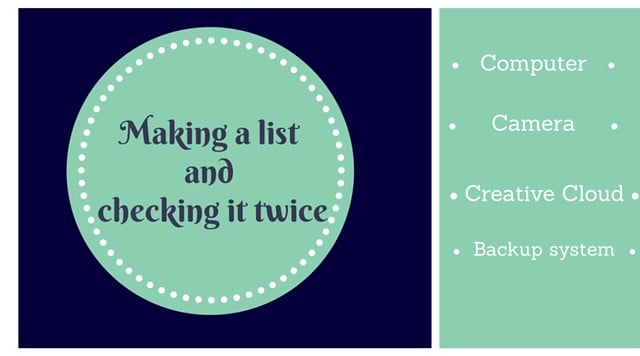If you're blogging for more than a hobby, it's time to come up with a plan. Follow this template to help you write a plan that fits your dreams.

When I first started this whole blogging thing five years ago, it was a hobby, something I planned to do in my free time. Somewhere along the way, I got hooked. Okay, that was probably only one or two months into it because I loved every single aspect of blogging.
It was my dad that pointed out to me several years ago that if I was going to delve into every facet of blogging seriously, then I needed a plan. A business plan. Clearly he saw the "deer in headlights" look in my eyes and, thankfully, gave me a push in the right direction. A few days later, there was an email in my mailbox, with an outline of the things I might include in this plan.
He reminded me that if I hoped to make this a career path, or even something that brought in some extra money, it was very important to inject some planning so that I had realistic goals and could give myself some economic comfort about where the whole thing was going. I've learned that it's one thing if your blog is to be a hobby, but it is an animal of an entirely different color if it is to be a rewarding long-term project for you, as well as a contributor to family income.
It is hard to realize your dream without a plan!
Since then, I've tweaked, added, deleted and spent hours deliberating this plan, and this post is the result of all of that.
Yes, I'm coming from the perspective of a food and running blogger, but these ideas can be used regardless of your blogging specialization. It's a template, a jumping off point so that you can pull your ideas together in one succinct document.
Remember, this is a plan...and plans are meant to be changed. Business plans are very helpful when a new opportunity comes your way. "Sure, it may give me some exposure, but does this fit into my plan? Does it feed my long-term goals?" That being said, don't let your plan stop you from considering opportunities that you didn't even know were a possibility when you wrote the first draft. Tweak and change as needed.
Let's dive in!
A. Mission statement
First things first, you need a mission statement.
1) What is the blog about in a general sense?
2) What are your goals?
3) What do you need to do to accomplish them?
B. What is your opportunity?
Any business plan should cover certain fundamentals. Some of these things seem obvious, but if you sit down to fill in the blanks, it can help crystallize your thoughts and be a great motivator for you.
This is generic, so use your imagination to make the categories fit the particulars of working as a blogger in your niche.

1) What you do
2) What you have to offer
- Outline your experience, expertise, strong points (e.g., photography, special needs education knowledge, recipe development, fashion know-how, humorous writing style)
3) The market you want to address
- Gluten-free recipes, fitness, beauty tips, photography, WordPress hacks, fashion, etc.
4) The uniqueness of what you do
- What are the vision and main objective of your blog?
- What advantages do you see that you have over your competitors? Read other blogs and make a list of things that you love or don't love about their blog content, writing style or photography, for example. I'm not suggesting that you copy others, but pinpointing the things that draw you to a blog and keep you coming back can be a good jumping-off point.
- Consider starting a secret Pinterest board where you store links to all of your favorite blogs. Reference these when looking for inspiration or design ideas.
Sooner or later, you will have to think about your legal business structure - sole proprietorship, LLC (here's a great article on how and why to set up an LLC). You may also eventually want to trademark your blog name.
C. Marketing and sales, blog-style
If this section is carefully written, it will help you formulate a plan to get your blog in front of your readers' eyes and, possibly, the eyes of brands and PR agencies.
1) Who are your target readers?
- What are your readers looking for? Why would they come to your blog? How old are they? Where do they live? Are they single or are they married with kids?
- How will you talk to your readers? For example, are they professionals in your area of expertise? This will likely determine your writing style and content.
2) How are you going to reach them?

- Social media. Outline specific plans for each social media channel (i.e., Facebook, Twitter, Google+, Instagram and any others). How often do you plan to post on each social media channel? What's your plan for sharing the content of other bloggers in your field?
- Insightful comments on other blogs, which may lead new readers to your blog
- Blog karma (link to other bloggers in your posts and on social media)
- Above all, quality content
3) Who is your competition?
- This is not meant to build a negative competitive environment amongst fellow bloggers, but rather to encourage you to become familiar with other bloggers in your niche.
- What are their strengths and weaknesses? This will help you to focus in on the content you want to put on your blog and how you might present it. Let's learn from each other!
4) What sets you apart?
- Out of all of the blogs out there, why will readers choose to read your blog?
5) How will you utilize social media?
- Forge relationships with other bloggers, magazine editors and brands through social media channels.
- Promote your content and other bloggers' content.
- Be a part of Facebook groups where you share ideas and tips with other bloggers.
- Be a part of Pinterest group boards where you share others' content, as well as your own.
6) How do you price yourself/your blog?
- If one of your goals is to work with brands, write for digital or print magazines, attract photography clients, or any other income-producing option, you will eventually need to figure out a price that reflects your strengths.
- Consider the content on your blog, page views, social media reach and expertise in the area.
D. The moving parts
1) What are your physical and technological requirements?
- Are you working at home? What are your workspace requirements? Do you need a desk? A workspace separated from the main living area?
- Technology examples: computer, camera, Creative Cloud membership (for Photoshop, etc.)

2) What will your day-to-day schedule look like?
- That's a fancy way of saying, "What hours will you work?" This is a big one! When you work from home and with our easy access to technology through smart phones, it's tempting to reach for your phone as soon as you wake up and make it the last thing to do before you go to bed. Is that okay with you and your family, or do you need a different plan so that you feel like you have a life that is separate from the blog? It took me a long time to figure out this part and I still feel like I struggle with it at times.
- When will you post? How many times per week? Which days? Look at your analytics and figure out the days when most readers come to your blog. Consider adjusting your schedule to fit their reading patterns.
- Social media is a notorious time suck. How will you schedule that time? For example, is it necessary for your blog to be on Twitter throughout the day, or could you check in once in the morning and once in the afternoon?
- I use a monthly calendar to outline all of my posts so I can look at a glance. The weekly calendar is for the nitty-gritty details. My all-time favorite calendar, the one that I live and breathe by everyday is the Life Planner from Erin Condren. It is beyond awesome!
- What are the to-dos for each morning and afternoon? How can you get ahead so you're not doing the dreaded last-minute scramble? Think ahead to what your readers might be interested in a month or two from now. For example, put on your thinking cap for back-to-school posts before August or September rolls around. Thinking ahead and planning will put you in control of your blog schedule and will give you time to focus on quality content.
3) What office systems, such as accounting, do you need?
- Invoicing, such as Freshbooks
- Accounting, such as Quickbooks
4) What consultants do you need?
- Web designer, IT, virtual assistant
- This could include classes to increase your expertise.
5) What do you need to learn?
- What conferences will you attend? You may want to attend a variety of conferences, ones that are relevant to your blogging niche and others that are more general.
- What classes will you need? If you're a food blogger, will you take cooking or photography classes to hone your skills? If you're a tech blogger, how do you keep up on the latest information?
- Will you invest in magazine subscriptions? Cooking, fashion, fitness, education, technology...there are magazines for everything you can think of and it's a great way to keep up with trends, important players in the business, etc.
- My favorite all-purpose blogging magazine is iBlog Magazine, which is packed with helpful information each month.
E. Financial Forecasts
I know, I know - I just heard a big sigh. I think I sighed, too. This part may be a little daunting, but it turns plans into necessary numbers. The critical part is the first 12 months, but it's a good idea to do a 2 to 3 year forecast if you can.
What are some ways to make money from your blog? Some bloggers stick with ad networks, and others work with brands or utilize affiliate links on their blogs. You may choose to pitch to digital or print magazines, or write for other sites that hire guest contributors.
If you're not sure where to start or find yourself sitting on a plateau, check out this helpful ebook, How to Monetize Your Food Blog (thought the suggestions are relevant for almost any kind of blog). While you're there check out their Media Kit template, which is a must if you plan to work with brands.
1) Cash flow
- Cash balance and monthly cash flow pattern for the first 12 to 18 months. This should include capital and revenue.
2) Profits and losses
- The level of profit you expect, considering your projected income and overhead costs (e.g., blog hosting company, backup system, internet service, food costs for recipe development, conference fees and so on).
- For some great examples of monthly balance sheets, check out Pinch of Yum's monthly statements. We can all dream to have numbers like theirs!
3) Income
- Amount of money you can expect from income sources (e.g., ads, affiliates, magazine work, brand sponsorships, ebook and so on)
F. Assessing Progress
1) How will you measure your success at achieving your goals?

- The measurements that you choose depend upon the goals you set for your blog. While some are measurable by numbers, others are more subjective. This is a really personal choice.
2) Subjective examples:
- Personal satisfaction and happiness (that's big!), relationships built, growth of blog community, improvement in quality of blog content
3) Objective examples:
- Pageviews, social media reach, brands contracts or ambassadorships, income
G. Other
1) Put dates to your goals
- When do you wish to achieve each goal?
- Outline short-term and long-term goals
2) How will you grow?
- If the model is dynamic, your business/blog will have a much better chance of success, and you will be able to maintain and increase your interest and ongoing challenges.
I know that there is a lot of information here, and a lot to think about. Rome wasn't built in a day, nor is a blog business plan. Take your time. Add to your plan day-by-day, make changes as needed. This is an ongoing process, one that will shift and change as you and your blog evolve.
Have fun with it! These are YOUR dreams. Put them to paper and start to chip away.
If you have any other other suggestions for items to include in a blog business plan, please share them in the comments below.
Disclosure: This post contains links to affiliate pages. Any revenue made from sales through these links helps to support this blog. Thank you!



Bloggin Brandi
Others show up to read your blog and seem to show interest in it as a business, so why shouldn't you. I like the treating your blog as a business idea. Kinda catchy but makes perfect sense. Consistency is my struggle.